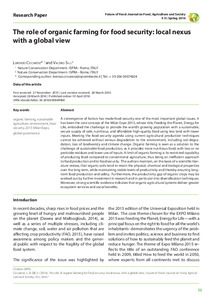| dc.date.accessioned | 2016-05-03T12:35:35Z | |
| dc.date.available | 2016-05-03T12:35:35Z | |
| dc.date.issued | 2016-04-10 | |
| dc.identifier.issn | 2197-411X | |
| dc.identifier.uri | urn:nbn:de:hebis:34-2016030849988 | |
| dc.identifier.uri | http://hdl.handle.net/123456789/2016030849988 | |
| dc.language.iso | eng | |
| dc.publisher | Department of Organic Food Quality and Food Culture at the University of Kassel, Germany and Federation of German Scientists (VDW) | eng |
| dc.rights | Urheberrechtlich geschützt | |
| dc.rights.uri | https://rightsstatements.org/page/InC/1.0/ | |
| dc.subject | organic farming | eng |
| dc.subject | sustainable agriculture | eng |
| dc.subject | environment | eng |
| dc.subject | food security | eng |
| dc.subject | 2015 Milan Expo | eng |
| dc.subject | global governance | eng |
| dc.subject.ddc | 630 | |
| dc.title | The role of organic farming for food security: local nexus with a global view | eng |
| dc.type | Aufsatz | |
| dcterms.abstract | A convergence of factors has made food security one of the most important global issues. It has been the core concept of the Milan Expo 2015, whose title, Feeding the Planet, Energy for Life, embodied the challenge to provide the world’s growing population with a sustainable, secure supply of safe, nutritious, and affordable high-quality food using less land with lower inputs. Meeting the food security agenda using current agricultural production techniques cannot be achieved without serious degradation to the environment, including soil degradation, loss of biodiversity and climate change. Organic farming is seen as a solution to the challenge of sustainable food production, as it provides more nutritious food, with less or no pesticide residues and lower use of inputs. A limit of organic farming is its restricted capability of producing food compared to conventional agriculture, thus being an inefficient approach to food production and to food security. The authors maintain, on the basis of a scientific literature review, that organic soils tend to retain the physical, chemical and biological properties over the long term, while maintaining stable levels of productivity and thereby ensuring long-term food production and safety. Furthermore, the productivity gap of organic crops may be worked out by further investment in research and in particular into diversification techniques. Moreover, strong scientific evidence indicates that organic agricultural systems deliver greater ecosystem services and social benefits. | eng |
| dcterms.accessRights | open access | |
| dcterms.bibliographicCitation | In: Future of Food: Journal on Food, Agriculture and Society. Witzenhausen : University of Kassel, Department of Organic Food Quality and Food Culture. - Vol. 4, No. 1 (2016), S. 56 - 67 | |
| dcterms.creator | Ciccarese, Lorenzo | |
| dcterms.creator | Silli, Valerio | |

